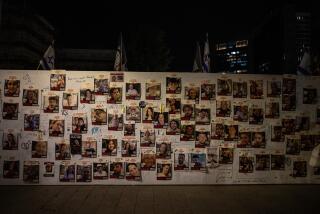We can’t win this war the old way
- Share via
When the bombs hit my native city, I was asleep in California. Waking, I watched the wounded emerging from those familiar London Tube stations and the wreckage of the No. 30 bus, all mediated through American television. One commentator said, “This shows we live in a world at war.” And every fiber in my body cried: No, that is not the lesson of London.
London knows firsthand what war is like. But this is not a war in the sense that American commentators like to imagine it. Wars are won by armies. This one never will be. It must be fought differently.
First, we must acknowledge that there will be more of this. We’re not fighting against a single group that can be defeated, like Hitler’s Wehrmacht. Terrorism is a technique, a means to an end, made more widely available by what we usually call “advances” in the technology of killing, and by the ease with which people can now move cheaply within and across borders. It will be used, and used again. To some extent, we will have to learn to live with it, as we do with other chronic threats.
This is where London is most impressive. The capital’s police chiefs had already warned that the question was “not if but when” a terrorist attack would come. Contingency plans for the emergency services were in place, and seem to have worked reasonably well. The matter-of-fact phlegmatism with which Londoners met Thursday’s attacks reflected long experience, notably of 30 years of IRA bombings, as well as national temperament. “Just getting on with it,” as Londoners do, is the best answer ordinary people can give to the terrorists.
How much freedom are we now prepared to sacrifice in the name of security? There is a real danger that countries such as the United States and Britain will move toward a national security state, with further curtailment of civil liberties. That must not be -- for it will cost us liberty without bringing us any guarantee of security. I, for one, would rather remain more free, and face a marginally higher risk of being blown up by a terrorist bomb.
This does not mean being passive in response to these atrocities. But the right response does not lie, as commentators on Fox News would have us believe, in more military firepower to zap “the enemy” in Iraq or elsewhere. It lies in skilled policing and intelligent policy. Quietly refusing the melodramatic metaphor of war, officials of London’s Metropolitan Police described the sites of the Tube and bus bombings as “crime scenes.” That’s right. Crimes.
Working in the most ethnically diverse city in the world, they have developed patient techniques of community relations and intelligence-gathering, as well as evidence-gathering after the event. That won’t stop every attack. It didn’t stop this one. But skilled policing at home, not soldiering abroad, is the way to reduce the threat from terrorists who operate and sometimes, as in the Madrid bombings last year, live for years in the immigrant communities of our great cities. If that is true of London and Madrid, it applies equally to Toronto, Paris, Sydney or Berlin.
Then there is intelligent policy. It was right to drive Al Qaeda out of Afghanistan. By contrast, it becomes increasingly clear that the invasion of Iraq was a mistake, almost certainly creating more terrorists that it eliminated. But now we have to make the best of a bad job there. The last thing we should do in response to this attack is to scuttle out of Iraq. On the contrary, now is the time for all democracies to rally round the cause of building a peaceful and halfway free Iraq, while insisting on further changes in occupation policy from a sobered United States, no longer infused with the neoconservative hubris of three years ago.
A peace settlement between Israel and Palestine would remove another great recruiting sergeant for Islamist terrorists. And, yes, working toward the modernization, liberalization and eventual democratization of the wider Middle East is the only certain, long-term way to drain the swamp in which terrorist mosquitoes breed. Here, it is Europe rather than the United States that needs to wake up, urgently, to the imperative of doing more.
These days, events that happen faraway, in Khartoum or Kandahar, affect us directly -- sometimes fatally -- as we commute to work, sitting in the underground train between King’s Cross and Russell Square. There is no such thing as foreign policy anymore. That is perhaps the deepest lesson of London.
More to Read
Sign up for Essential California
The most important California stories and recommendations in your inbox every morning.
You may occasionally receive promotional content from the Los Angeles Times.










